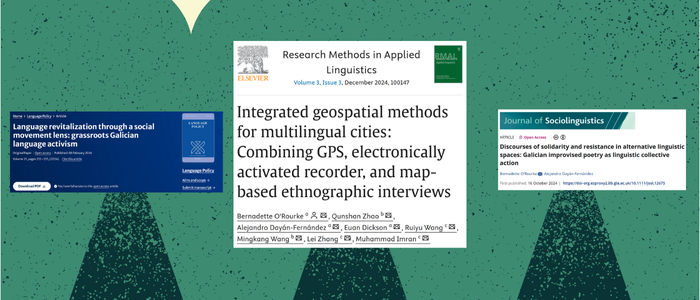Updates from SMLC Staff
Published: 29 January 2025
Recent achievements and publications from SMLC Staff
Three new publications from Prof Bernadette O’Rourke and Dr Alejandro Dayán-Fernández
Language revitalization through a social movement lens: grassroots Galician language activism
In this article, Prof Bernadette O’Rourke and Dr Alejandro Dayán-Fernández argue that language revitalisation movements should be studied as social movements. By using social movement theory, the authors systematically study a Galician grassroots organisation (north-west Spain) that creates language immersion spaces for the Galician language across cities, examining what factors help grassroots movements grow and what challenges they face in their language revitalisation efforts. The article points out that looking at these efforts through the lens of social movement theory helps us understand how people are working together to promote not only their minoritised language but also wider social justice endeavours. Ultimately, the article notes that these initiatives are not just about the language itself but about building social connections across communities and carrying out collective action strategies to address global challenges from a local, bottom-up perspective.
The article has been published by the journal of Language Policy and can be found open access here.
Integrated geospatial methods for multilingual cities: Combining GPS, electronically activated recorder, and map-based ethnographic interviews
Through a collaboration between researchers in sociolinguistics, urban analytics, and engineering, Prof Bernadette O’Rourke and Dr Alejandro Dayán-Fernández have contributed to the development of a multidisciplinary methodology to better capture the complexities of linguistic behaviour in multilingual cities. Usually, we study how multilingual people use languages by asking them to remember and report their experiences. This article explores a new way to study these experiences in real time using GPS tracking, a device called the Electronically Activated Recorder (EAR), and map-based interviews. GPS and EAR can help us understand where and how people use different languages and learn new ones. Although these tools are common in fields like Geography and Psychology, they are not often used in language studies. This article looks at the pros and cons of using GPS and EAR to observe language use. It also discusses ethical issues related to tracking and recording people and suggests ways to protect privacy. By combining these technologies with traditional research methods, the articles aim to better understand how multilingual people use languages in cities, focusing on a study of Gaelic speakers in Glasgow.
The article has been published by Elsevier as part of a special issue on Research Methods in Applied Linguistics and can be found open access here.
Discourses of solidarity and resistance in alternative linguistic spaces: Galician improvised poetry as linguistic collective action
In this article, Prof Bernadette O’Rourke and Dr Alejandro Dayán-Fernández focus on alternative ways of understanding language in the context of minority language advocacy through an examination of the Galician tradition of singing‐in‐verse, known as regueifa. It proposes the notion of “linguistic collective action” to refer to the battery of resistance and solidarity strategies that lead grassroots movements to achieve social transformation. The authors put emphasis on language revitalization practices that go beyond traditional understandings of language reclamation as part of nationalist endeavours or more recent notions of language as an economic asset. Through a multi‐sited ethnography of the interconnected spaces in which urban‐based Galician speakers engage in collective action through the practice of regueifa, the authors argue that when progressive values (e.g.: LGBTQ+ advocacy, feminism, and anti‐neoliberalism) are intertwined with the use of minoritized language reclamation, social transformation can be incrementally attained.
This article has been published by the Journal of Sociolinguistics and and can be found open access here.
Helen McKelvey featured in French Christmas Carol Podcast
In December, I was approached by an independent podcast producer to record some material for a Christmas themed Things Unseen podcast on the French carol, Minuit Chrétiens, better known to us in translation as O Holy Night. I was able to share a bit of my research into France's relationship with slavery in the mid-nineteenth century, and how that shaped the lyrics and reception of the carol. You can find the recording of the podcast here: https://www.thingsunseen.co.uk/podcasts/a-carol-for-the-soul/. As a follow up, the Religion Media Centre asked me to write up the material into a longer form blog piece, where I delve a bit deeper into the lyrics, the author, and the context of the carol. You can find that here.
First published: 29 January 2025
<< News


